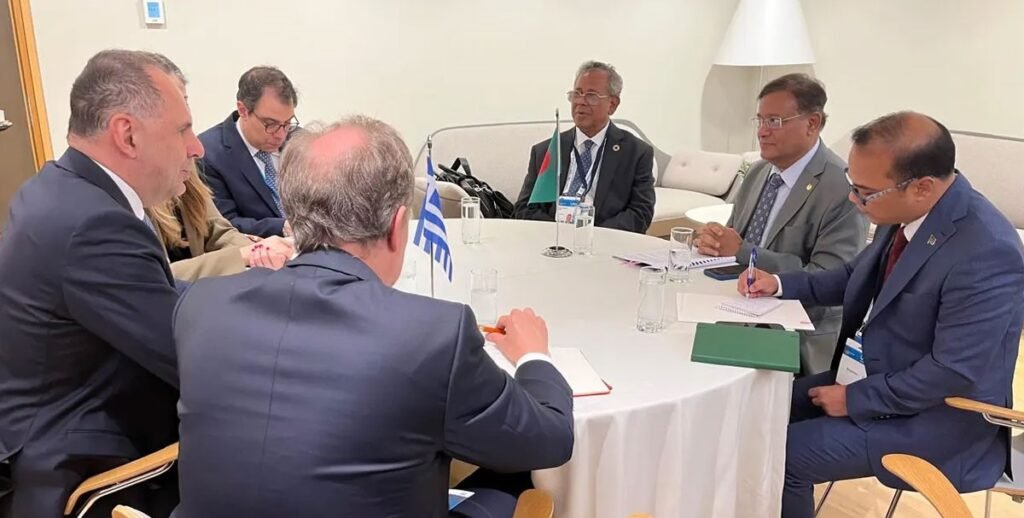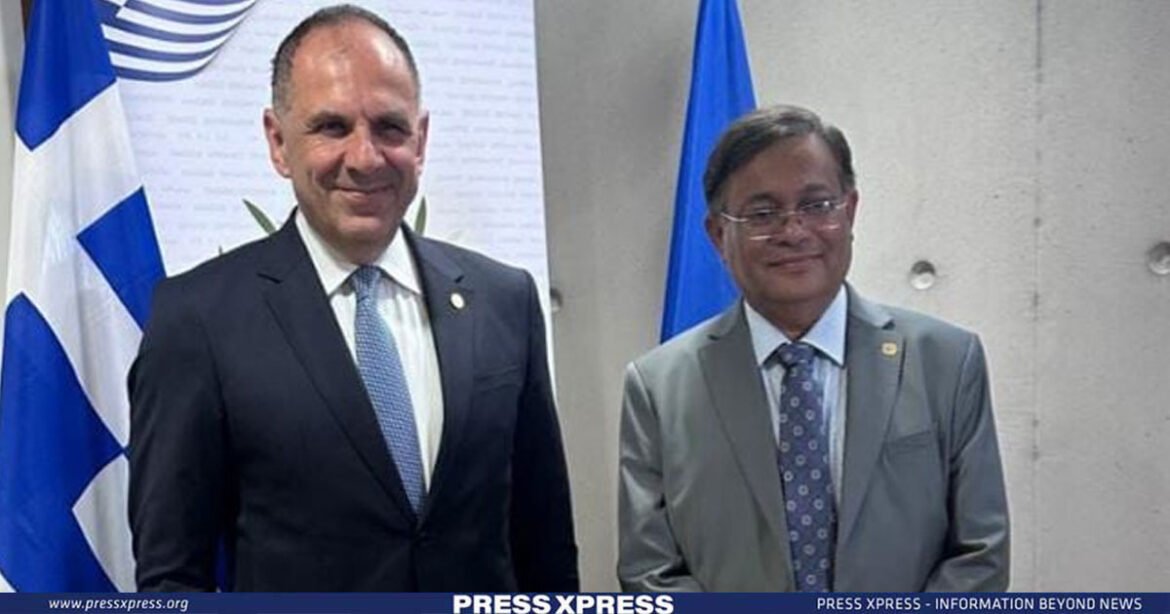- Greece is keen to open a diplomatic mission in Dhaka
- The Greek foreign minister agrees on the need to enhance bilateral trade
- Around 3,400 Bangladeshi migrants regularized in Greece in 2023
The relationship between Bangladesh and Greece dates back well before 1972, it refers to before the time of Alexander the Great, Greek historians like Herodotus and Hecataeus used the name “India” to mark only the region surrounding the Indus River. However, from the time of Megasthenes onward, the term “India” became associated with the entire Indian subcontinent. From this historical perspective, it can be said that Greece has maintained a close relationship with Bangladesh for over two millennia, as Bangladesh shares the ancient Indian history and cultural heritage.
You Can Also Read: BANGLADESH’S RISING TIES WITH LATIN AMERICA
This longstanding association is evidenced by the renowned Greek monuments located at the Teacher-Student Center (TSC) of Dhaka University, which were designed by the famous Greek architect Constantinos Doxiadis. Additionally, it is crucial to recognize the mutual solidarity between Greece and Bangladesh throughout their respective liberation struggles, with Greece’s beginning on March 25, 1821, and Bangladesh’s in 1971.
Rabindranath Tagore’s visit to Greece in 1926 also represents a defining moment in the intercultural history shared by the two nations. Furthermore, the first Bengali poet and dramatist to learn Greek was Michael Madhusudan Dutt.
Greece was among the first countries to recognize the independence of Bangladesh and supported the country throughout its rebuilding process. Over the past 50 years of diplomatic ties, Bangladesh and Greece have successfully cultivated a friendly relationship and have come to share common perspectives on a range of regional and global issues, such as climate change, the global refugee crisis, terrorism and militancy, and the depletion of natural resources.
Bilateral Economic Relations
The bilateral trade relationship between Bangladesh and Greece has continuously grown stronger. In February 1987, the two countries signed an economic agreement titled “The Agreement on Economic and Technical Cooperation” to further bolster their commercial ties. Bangladesh’s primary exports to Greece include ready-made garments, frozen foods, chemical products, ceramics, jute, and leather goods.
Over the past 27 years, both countries have experienced consistent growth in their bilateral trade. Greece’s exports to Bangladesh have increased at an annualized rate of 8.98%, while Bangladesh’s exports to Greece have grown at a rate of 8.19% per year.
The thriving Bangladesh-Greece cooperation is not merely a historical footnote, but rather a living testament to the power of data-driven collaboration and exchange across national borders. The steady growth in trade, investments, and people-to-people connections between the two countries underscores the depth and vibrancy of this bilateral relationship.
Greece Keen to Open Diplomatic Mission In Dhaka
Recently, Foreign Minister Dr. Hassan Mahmud of Bangladesh and his Greek counterpart, George Gerapetritis, held a bilateral meeting on the sidelines of the 9th Our Ocean Conference at the Stavros Niarchos Foundation Cultural Center in Athens.
During this meeting, Greek Foreign Minister George Gerapetritis assured that the opening of a diplomatic mission in the Bangladeshi capital of Dhaka is a priority for the Greek government. This was seen as a significant development in the ongoing efforts to strengthen the bilateral ties between the two nations.

Furthermore, the Greek foreign minister warmly accepted the invitation extended by his Bangladeshi counterpart to visit Dhaka. Minister Gerapetritis expressed that this upcoming tour would be an excellent opportunity to formally inaugurate the new Greek Diplomatic Mission in the Bangladeshi capital.
Both the foreign ministers pledged to forge deeper bilateral cooperation between Bangladesh and Greece in a range of areas, including migration and mobility, trade and investment, shipping, manpower, and recruitment, as well as the development of renewable and alternative energy infrastructure.
This high-level meeting and the commitments made by the Greek government to open a diplomatic mission in Dhaka, coupled with the plans for a reciprocal visit by the Greek foreign minister, underscored the growing importance and momentum in the Bangladesh-Greece bilateral relationship. The two countries are clearly seeking to expand their collaboration across diverse sectors, with the ultimate goal of further strengthening the longstanding ties between them.
Not Having Embassy in Bangladesh Causes Difficulties
In 2022, Bangladesh and Greece signed a Memorandum of Understanding (MoU) to facilitate the recruitment of Bangladeshi migrant workers in Greece. However, the implementation of this agreement has faced some delays, as Greece is yet to formally initiate the recruitment process as per the terms of the MoU.
The MoU, which was signed in February 2022 in the capital Dhaka, stipulates that Greece will hire up to 4,000 workers from Bangladesh on an annual basis. This was seen as an important step in strengthening the bilateral cooperation between the two countries in the area of labor mobility.
According to officials at the Bangladesh embassy in Athens, the recruitment process could not be started due to difficulties in the visa issuance process. This challenge has arisen because Greece does not currently have an embassy located in Bangladesh, which has complicated the visa application procedures for Bangladeshi workers.
To overcome this obstacle, Bangladesh has been urging Greece to establish a visa forwarding service (VFS) in Dhaka. This would allow Bangladeshi applicants to submit their visa applications without the need to travel to the Greek embassy in India, which is the current requirement.
The delay in implementing the 2022 MoU on labor recruitment has highlighted the need for Greece to enhance its diplomatic presence and consular services in Bangladesh. Resolving these logistical challenges will be crucial in ensuring the smooth operationalization of the bilateral agreement and the successful deployment of Bangladeshi migrant workers to Greece as envisioned under the MoU.
Greece Regularizes 10,000 Bangladeshis
According to officials from the Bangladeshi foreign ministry, there are approximately 25,000 Bangladeshi nationals currently residing in Greece. In a positive development, the Greek government has already regularized the legal status of around 10,000 of these Bangladeshi migrants, and there are indications that further steps will be taken to legalize the status of the remaining Bangladeshi residents.
During the recent meeting, Bangladeshi Foreign Minister Hasan Mahmud expressed his gratitude to the Greek government for legalizing the Bangladeshi nationals who were previously living in Greece under a Memorandum of Understanding (MOU) on Migration and Mobility. Minister Mahmud then requested his Greek counterpart to continue the process of regularizing the legal status of the rest of the Bangladeshi community in Greece.
In response, the Greek Foreign Minister indicated that Greece plans to recruit more Bangladeshi professionals shortly, particularly in sectors such as agriculture, tourism, hospitality, and construction. This signals Greece’s intention to expand further employment opportunities for Bangladeshi workers within the European country.
The two ministers also agreed that meaningful cooperation between Bangladesh and Greece in the shipping sector could create a mutually beneficial scenario, as the two countries can complement each other’s strengths in this industry. They further agreed on the need to establish a robust legal framework to facilitate and guide this collaboration in the shipping domain.


